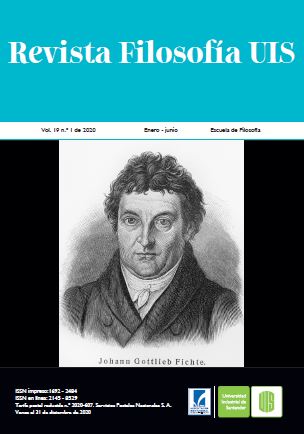Aristotle and Thomas Aquinas: an analysis around the polis and the res publica
Published 2020-01-01
Keywords
- polis,
- res publica,
- Aristotle,
- Thomas Aquinas,
- History of philosophy
How to Cite
Copyright (c) 2020 Revista Filosofía UIS

This work is licensed under a Creative Commons Attribution 4.0 International License.
Abstract
This paper analyzes the relationship between the concepts polis and res publica. The first concept developed by Aristotle in his works Nicomachean Ethics and Politics; the second, exposed by Thomas Aquinas in Commentary on the Ethics of Aristotle, Commentary on the politics of Aristotle and The monarchy, to the king of Cyprus. The objective of this article is to answer the question: what are the differences and similarities between the concept polis in Aristotle and the concept of res publica in Thomas Aquinas? To respond to this approach, three sections are structured: initially, the concept of polis is deepened; then, it delves into the thomist res publica and, finally, the points in common and in contradiction between both terms are presented.
Downloads
References
Aristóteles (1998). Ética Nicomáquea; Ética Eudemia. (J. Pallí Bonet, trad.). Madrid: Gredos.
Aristóteles (1998). Política. (M. García Valdés, trad.). Madrid: Gredos.
Berti, E. (2012). El pensamiento político de Aristóteles. (H. Aguilà, trad.). Madrid: Gredos.
Belmonte, M. Á. (2010). La recepción de la prudencia política aristotélica en la síntesis de santo Tomás. En P. Roche (ed.), El pensamiento político en la Edad Media (pp. 275-286). Madrid: Centro de Estudios Ramón Areces.
Briguglia, G. (1999). ‘Est respublica quoddam corpus’. Una metafora politica nel medioevo. Rivista di Storia della Filosofia, 54(4), 549-571.
Canning, J. (1980). The Corporation in the political thought of the italian jurists of the thirteenth and fourteenth centuries. History of Political Thought, 1(1), 9-32.
Cappelletti, Á. J. (1987). El aristotelismo político de Tomás de Aquino. Revista de Filosofía de la Universidad de Costa Rica, 25(62), 201-205.
Calvo, T. (2008). Aristóteles y el aristotelismo. Madrid: Akal.
Cicerón (1984). Sobre la república. (Á. D'ors, trad.). Madrid: Gredos.
Copleston, F. (1960). El pensamiento de santo Tomás. (E. Frost, trad.). Ciudad de México: Fondo de Cultura Económica.
Costa, P. (2007). La soberanía en la cultura político-jurídica medieval: imágenes y teorías. Res publica: revista de filosofía política, (17), 33-58.
Chueca, Á. y Robles, L. (1989). Estudio preliminar. En Tomás de Aquino, La monarquía (pp. I-XLV). (L. Robles, trad.). Madrid: Tecnos.
Forment, E. (2010). Principios fundamentales de la filosofía política de Santo Tomas. En P. Roche (ed.), El pensamiento político en la Edad Media (pp. 93-112). Madrid: Centro de Estudios Ramón Areces.
Gallego, J. (1996). Aristóteles, la ciudad-Estado y la Asamblea democrática. Reflexiones en tomo al libro III de la Política. Gerión, (14), 143-182.
Gallego, J. (2006). El inventario de las poleis del «Copenhagen Polis Centre» y la definición de la polis como ciudad y como estado. Ordia Prima, 5, 157-172.
Gallego, J. (2016). La Pólis griega: población, territorio y modelos políticos. Sociedades Precapitalistas, 6(1), 1-14.
Goycoolea, R. (2005). Organización social y estructura urbana en las ciudades ideales de Platón y Aristóteles. A Parte Rei, (40), 1-13.
Grabmann, M. (1930). Santo Tomás de Aquino. (A. Salvador, trad.). Barcelona: Labor.
Hansen, M. (2006). Polis: an introduction to the ancient Greek city-state. New York: Oxford University Press.
Hodgson, L. (2017). Res publica and the Roman Republic ‘Without Body or Form’. New York: Oxford University Press.
Hood, J. (2002). The essential Aquinas: writings on philosophy, religion and society. Connecticut: Praeger Publishers.
Keys, M. (2006). Aquinas, Aristotle, and the Promise of the Common Good. New York: Cambridge University Press.
Llanos, D. (2013). Política de Aristóteles y sus ciudades (in)finitas. Sapiens Research, 3(2), 24-28.
Marey, A. (2016). From people to community: a description of the social order by Thomas Aquinas. Part 1: populus, respublica, multitudo. Russian Sociological Review, 15(4), 162-175.
Martínez, A. (1992). La concepción de la política en Santo Tomás. En Actas del I Congreso Nacional de Filosofía Medieval (pp. 381-388). Zaragoza: Sociedad de Filosofía Medieval.
Meyer, H. (1944). The philosophy of St. Thomas Aquinas. (F. Eckhoff, trad.). London: B. Herder Book Co.
Miethke, J. (1996). Las ideas políticas de la Edad Media. (F. Bertelloni, trad.). Buenos Aires: Biblos.
Platón (1999). Diálogos VII (Leyes I-VI). (F. Lisi, trad.). Madrid: Gredos.
Platón. (1999). Diálogos IX (Leyes VII-XII). (F. Lisi, trad.). Madrid: Gredos.
Reeve, D. (2009). The naturalness of the polis in Aristotle. En G. Anagnostopoulos (ed.), A companion to Aristotle (pp. 512-525). Oxford: Wiley-Blackwell Publishing.
Rigotti, F. (1989). Metafore della política. Bolognia: Il Mulino.
Sakellariou, M. (1989). The polis-state: definition and origin. (D. Hardy, trad.). Atenas: Diffusion de Boccard.
Salisbury, J. (1984). Policraticus. (M. Alcalá, F. Delgado, A. Echánove, M. García Gómez, A. López Caballero, J. Vargas y T. Zamarriego, trads.). Madrid: Editora Nacional.
Sánchez, D. (2016). Cicerón y Agustín. A propósito de la república. Universitas Philosophica, 33(67), 217-238.
Sellers, M. (2009). The Influence on Marcus Tullius Cicero on modern legal and political ideas. Ciceroniana, 9, 245-280.
Sigmund, P. (1993). Law and Politics. En N. Kretzmann y E. Stump (eds.), The Cambridge companion to Aquinas (pp. 217-231). New York: Cambridge University Press.
Tomás de Aquino (1989). La monarquía. (L. Robles & A. Chueca, trads.). Madrid: Tecnos.
Tomás de Aquino (1988). Suma de teología II. (Regentes de Estudios de las Provincias Dominicanas en España, trads.). Madrid: Biblioteca de Autores Cristianos.
Tomas de Aquino y Pedro de Alvernia (2001). Comentario a la Política de Aristóteles. (A. Mallea, trad.). Navarra: Universidad de Navarra.
Tomás de Aquino (2010). Comentario a la Ética de Aristóteles. (A. Mallea, trad.). Navarra: Universidad de Navarra.
Tomás de Aquino (2012). La monarquía, al rey de Chipre. En Tomas de Aquino, Textos selectos (pp. 699-687). (L. Robles, trad.). Madrid: Gredos.
Thomas, R. (2002). La ciudad clásica. En R. Osborne (ed.), La Grecia Clásica: 500-323 a. C. (pp. 63-94). (G. Djembé, trad.). Barcelona: Editorial Crítica.
Woldring, H. (1999). On the purpose of the state: continuity and change in political Theories. En B. Sweetman (ed.), The failure of modernism: the cartesian legacy and contemporary pluralism (pp. 155-170). Washington D.C.: The Catholic University of America Press.

